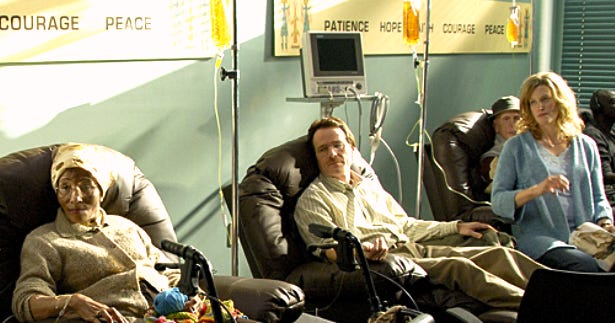Would Obamacare Have Saved Walter White's Soul?
[Warning: Non-Finale Breaking Bad Spoilers]
The Daily Beast‘s Jamelle Bouie claims that Obamacare would have ruined the premise of Breaking Bad:
Remember, the instigating action of the series is White’s cancer diagnosis–in order to pay for his treatments and leave a nest egg for his family, he teams up with a former student to make and sell methamphetamine. The moral logic of this aside, it’s not hard to see why he made the choice. Even with health insurance, courtesy of Albuquerque public schools, White had to make large initial deposits (in one case, of $5,000) and deal with expensive hospital stays. The surgery to remove cancer from his lungs cost nearly $200,000, an impossible sum for the vast majority of Americans, to say nothing of a public school teacher.
[…]
Breaking Bad begins in 2008. If it had taken place just two years later, White wouldn’t have had to worry about lifetime limits. Under ACA provisions that took effect in 2010, just a few months after the law was signed, insurance companies are prohibited from imposing lifetime limits on benefits. If the series had started in 2014, the year Obamacare is fully implemented, White would have had few financial worries. Not only is that the year the law bans annual limits on insurance coverage, but it also puts a cap on out-of-pocket expenses for families and individuals. At most, the White family would have had to pay $12,700 for Walt’s care. A large sum, but not so much that it makes sense to go into the meth-dealing business.
Josh Barro, however, knows better:
The ACA would likely have done nothing to help Walter White. And that’s actually a feature of the ACA, not a bug.
Remember, White (on the show, a high-school chemistry teacher who became a methamphetamine producer to pay his cancer treatment bills) had health insurance. He didn’t incur enormous out-of-pocket costs because his plan had a high deductible or a low benefit limit. He incurred them because his family pressured him into getting treatment from Dr. Delcavoli, a superstar oncologist who didn’t participate in Walt’s HMO.
[…]
Insurance companies have been responding to pressure to keep exchange premiums down by excluding expensive doctors and hospitals. For example, none of the plans that will be offered in California’s insurance exchange will include Cedars-Sinai, a top Los Angeles hospital; only one insurer will include UCLA Medical Center.
[…]
Bouie raises the topic of lifetime benefit limits, which Obamacare has prohibited since 2010. But even if Walt had been running up insurance-eligible bills within an HMO network, he likely wouldn’t have been affected by a lifetime limit. As of 2009,
69% of workers covered by large employer HMO plans had no lifetime benefit limit, and another 25% had a limit of at least $2 million.
Like me, Josh argues that the Breaking Bad character with the clearest understanding of the medical industry was none other than Walter White:
There is a voice for this idea on Breaking Bad: Walter White himself, who initially resists his family’s pleading, arguing that treatment is likely to be expensive and unpleasant and ineffective. Of course, on the show, the treatment ends up greatly extending Walt’s life span, because “Man gets expensive cancer treatment, becomes too sick from chemotherapy side effects to run his meth lab, dies anyway, and leaves his family penniless” is not a very interesting television plot.
In short, the show-ruining premise is not the ACA, but medical realism. Thank goodness for suspension of disbelief!
P.S. If you postpone your viewing of critically-acclaimed shows until you know that they deliver on their promise, feel free to begin Breaking Bad‘s transcendent tale of hubris and corruption.
The post appeared first on Econlib.


